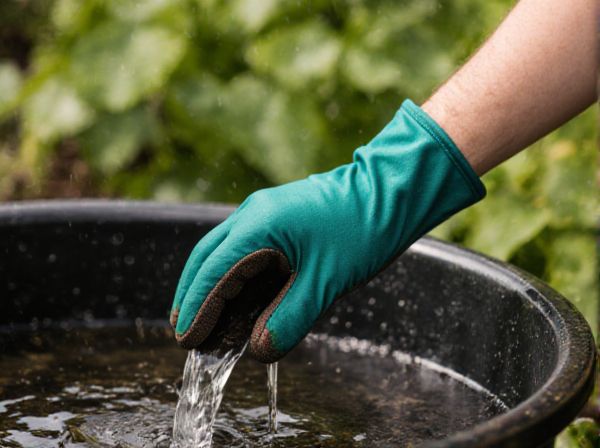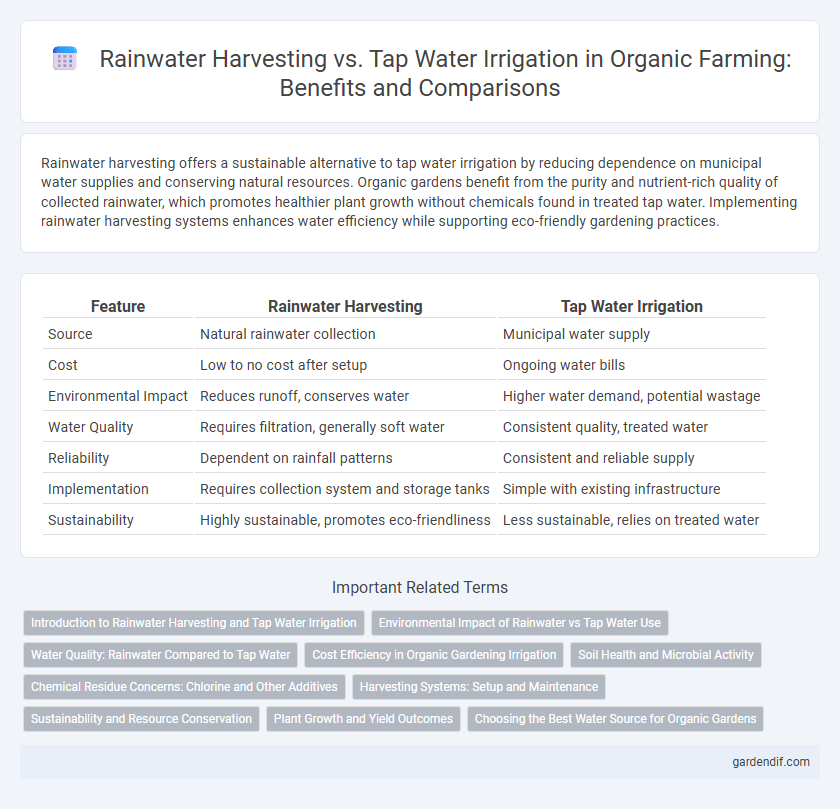
Rainwater harvesting vs tap water irrigation Illustration
Rainwater harvesting offers a sustainable alternative to tap water irrigation by reducing dependence on municipal water supplies and conserving natural resources. Organic gardens benefit from the purity and nutrient-rich quality of collected rainwater, which promotes healthier plant growth without chemicals found in treated tap water. Implementing rainwater harvesting systems enhances water efficiency while supporting eco-friendly gardening practices.
Table of Comparison
| Feature | Rainwater Harvesting | Tap Water Irrigation |
|---|---|---|
| Source | Natural rainwater collection | Municipal water supply |
| Cost | Low to no cost after setup | Ongoing water bills |
| Environmental Impact | Reduces runoff, conserves water | Higher water demand, potential wastage |
| Water Quality | Requires filtration, generally soft water | Consistent quality, treated water |
| Reliability | Dependent on rainfall patterns | Consistent and reliable supply |
| Implementation | Requires collection system and storage tanks | Simple with existing infrastructure |
| Sustainability | Highly sustainable, promotes eco-friendliness | Less sustainable, relies on treated water |
Introduction to Rainwater Harvesting and Tap Water Irrigation
Rainwater harvesting captures and stores natural rainfall for irrigation, reducing dependence on municipal tap water and promoting sustainable water use in agriculture. Tap water irrigation relies on treated water supplied through urban infrastructure, often incurring higher costs and depleting public water resources. Integrating rainwater harvesting systems enhances water conservation, lowers irrigation expenses, and supports organic farming by minimizing chemical exposure from tap water additives.
Environmental Impact of Rainwater vs Tap Water Use
Rainwater harvesting significantly reduces dependence on municipal water supplies, conserving freshwater resources and lowering energy consumption associated with water treatment and distribution. Unlike tap water irrigation, which often relies on chemically treated water, rainwater is naturally soft and free of additives, minimizing soil and plant contamination. This sustainable practice decreases runoff and erosion, promoting groundwater recharge and enhancing ecosystem health compared to conventional tap water usage.
Water Quality: Rainwater Compared to Tap Water
Rainwater harvesting provides water with low mineral content and minimal chemical additives, promoting healthier growth for organic plants compared to tap water, which often contains chlorine, fluoride, and other treatment chemicals that can alter soil pH and harm beneficial microorganisms. Tap water quality varies by region and may include contaminants like heavy metals or pollutants, whereas rainwater naturally dilutes airborne pollutants, offering a purer irrigation source. Utilizing rainwater for irrigation supports sustainable agriculture by reducing dependency on treated municipal water and preserving soil microflora essential for organic farming.
Cost Efficiency in Organic Gardening Irrigation
Rainwater harvesting offers significant cost efficiency in organic gardening irrigation by reducing reliance on tap water, which often involves higher utility fees and treatment costs. Capturing and storing rainwater minimizes water bills and leverages a free, natural resource, making it a sustainable investment for long-term savings. In contrast, tap water irrigation may incur recurring expenses and is less environmentally sustainable, impacting overall cost-effectiveness in organic garden maintenance.
Soil Health and Microbial Activity
Rainwater harvesting significantly improves soil health by providing natural, nutrient-rich water that enhances microbial activity and promotes sustainable nutrient cycling. Unlike tap water, which often contains chlorine and other chemicals detrimental to soil microbiota, rainwater maintains the natural balance of beneficial microorganisms essential for soil fertility. Enhanced microbial diversity from rainwater irrigation leads to better soil structure, increased organic matter decomposition, and improved plant growth in organic farming systems.
Chemical Residue Concerns: Chlorine and Other Additives
Rainwater harvesting significantly reduces exposure to chemical residues compared to tap water irrigation, as harvested rainwater is free from chlorine, fluoride, and other synthetic additives commonly found in municipal water supplies. Tap water often contains residual chlorine and chloramine used for disinfection, which can adversely affect soil microbiota and plant health over time. Utilizing rainwater for irrigation minimizes these chemical contaminants, promoting healthier organic gardens and improving soil quality without introducing potential toxins.
Harvesting Systems: Setup and Maintenance
Rainwater harvesting systems require the installation of catchment surfaces, gutters, and storage tanks designed to maximize water collection and minimize contamination, often involving simple filtration to ensure water quality. Maintenance includes regular cleaning of filters and tanks to prevent debris buildup and microbial growth, ensuring sustainable irrigation for organic gardens. Tap water irrigation systems rely on municipal supply with minimal setup but entail ongoing costs and potential chemical exposure, making rainwater harvesting a more eco-friendly and cost-efficient choice for organic cultivation.
Sustainability and Resource Conservation
Rainwater harvesting significantly enhances sustainability by reducing dependency on municipal tap water, which often requires extensive energy for treatment and distribution. Utilizing rainwater for irrigation conserves vital freshwater resources and mitigates the environmental impact associated with groundwater depletion. Efficient rainwater systems promote resource conservation by capturing and storing natural precipitation, supporting organic agriculture with minimal ecological footprint.
Plant Growth and Yield Outcomes
Rainwater harvesting provides plants with nutrient-rich, soft water that enhances soil microbiome activity, leading to improved plant growth and higher crop yields compared to tap water irrigation. Studies show rainwater's optimal pH and lower chlorine content reduce plant stress and increase photosynthesis efficiency, resulting in healthier biomass accumulation. Tap water often contains chemicals that can inhibit root development, negatively affecting long-term yield outcomes in organic gardening systems.
Choosing the Best Water Source for Organic Gardens
Rainwater harvesting conserves natural resources by collecting and storing runoff, delivering nutrient-rich, chlorine-free water that enhances soil health in organic gardens. Tap water often contains salts and chemicals that can disrupt microbial balance and degrade soil quality, potentially affecting plant growth and organic certification. Selecting rainwater ensures eco-friendly irrigation aligned with organic principles, supports plant vitality, and reduces reliance on municipal water systems.
Rainwater harvesting vs tap water irrigation Infographic

 gardendif.com
gardendif.com